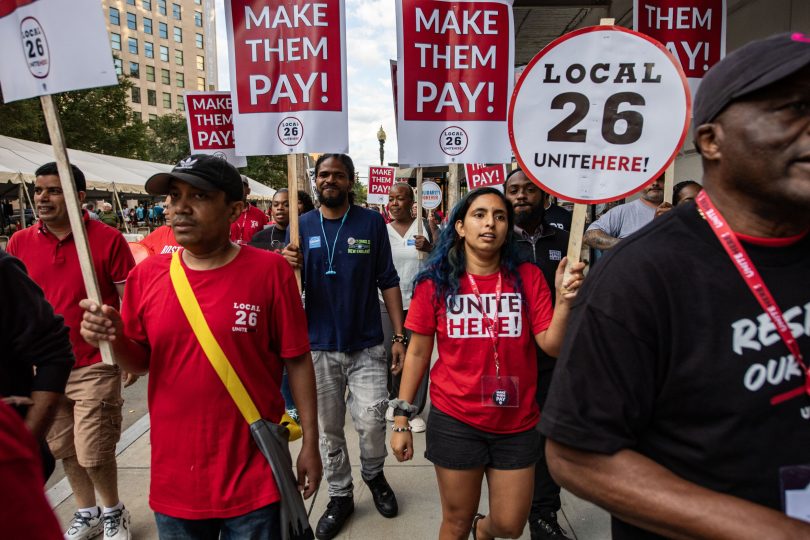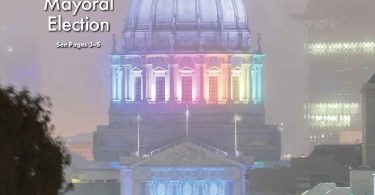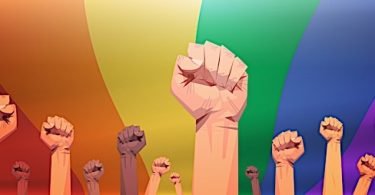I grew up in the Appalachian labor stronghold of Pittsburgh where I learned the importance of supporting unions alongside my ABCs. Last year, I proudly put everything I’d learned into practice when I joined my first union. This past Labor Day, I reflected on the lessons of my first year of union membership and recognized what’s at stake for queer workers like me this election.
Despite the recent surge of organizing (including 2023’s “Hot Labor Summer“) and the previous decades of monumental progress, LGBTQ people continue to face discrimination, retaliation, and violence in the workforce. A 2021 UCLA study found that 47 percent of LGBTQ workers reported experiencing discrimination or harassment at work due to their sexual orientation or gender identity. This study also reported that that 46 percent of LGBTQ workers were not open about being LGBTQ to their supervisor. These numbers indicate how much further our workplace protections must go to guarantee every worker feels safe being their authentic self at work.
U.S. hotel workers demonstrate as they strike over the Labor Day holiday weekend outside of the Boston Park Plaza Hotel in Boston, Mass., on Sept. 2, 2024.
U.S. hotel workers demonstrate as they strike over the Labor Day holiday weekend outside of the Boston Park Plaza Hotel in Boston, Mass., on Sept. 2, 2024.
JOSEPH PREZIOSO/AFP via Getty Images
These stats are dismal and illustrate that devastating rollbacks to LGBTQ workers’ rights aren’t just a possibility, they’re a reality we’re already seeing happen. Attacks on efforts to improve working conditions and diversify the workforce are occurring nationwide. A think tank in Washington, D.C., has outlined a playbook, called Project 2025, crafted for a future conservative administration that would eliminate all of the Department of Labor’s DEI initiatives among other attacks on LGBTQ people and workers. One of the playbook’s most terrifying ideas equates being transgender, or in their words possessing “transgender ideology,” with pornography and will attempt to outlaw it. The think tank behind the playbook also believes that educators and public librarians who spread information about being transgender should be forced to register as sex offenders.
Republican Vice Presidential candidate JD Vance has platformed and attempted to enact some of these anti-LGBTQ and anti-worker policies. As a U.S. senator representing Ohio, Vance introduced legislation to federally criminalize gender-affirming health care for transgender youth and supported the Teamwork for Employees and Managers Act, which sought to undermine labor unions. These are just two examples of the many policies advocated by Vance and outlined in the conservative policy playbook that would put minority and LGBTQ workers at risk of increased workplace hostility, harassment, or even worse.
Baseless threats like these are also workplace safety issues impacting workers of all gender identities and sexualities. When workers cannot safely express and present themselves in the workplace, work output and team morale suffer. Gallup reported that “perceptions of inclusion affect a company’s quality, productivity, innovation and retention. Employees who don’t feel seen, heard, and valued are less liable to invest in their company with their performance, contribute their creativity and talent, or see a future for themselves in their organization.”
In the face of these attacks, I look to my LGBTQ union siblings for inspiration. I am motivated by recent historic strides made to diversify the workforce and support LGBTQ workers, both unionized and not. Monumental legislation like the Bipartisan Infrastructure Law/Infrastructure Investment and Jobs Act and the American Rescue Plan Act (ARPA) created millions of good, well-paying jobs helping historically disenfranchised communities and expanding opportunities for QTBIPOC (Queer, Trans, Black, Indigenous, People of Color) workers in a rebuilding economy. ARPA’s transformative investments included a $200 million investment into worker protection enforcement that has supported LGBTQ workers.
LGBTQ workers have continued the momentum of these federal actions and investments by organizing and fighting for collective bargaining rights and union recognition, better wages, employer coverage of gender-affirming health care, and more. The overlap between LGBTQ rights and labor organizing has long existed but the new wave of Gen Z union organizers is further illuminating just how interconnected all of our struggles are. The fight for a safe workplace is shared between LGBTQ people and workers and we must do everything we can to advance efforts to make our workplaces better and more inclusive.
Aside from the power to continue implementing inclusive policy to further support and expand the LGBTQ workforce, the next president may have the opportunity (and responsibility) to appoint two Supreme Court justices alongside the next National Labor Relations Board, which will make all the difference for the experiences, opportunities, and safety of the next generation of LGBTQ workers. Having a Supreme Court keen on rolling back LGBTQ rights and worker protections would cause irreversible damage to the progress of these two intersectional movements impacting the millions of Americans building this country’s future.
As our economy continues to evolve and diversify, our workforce should too. We must continue building pathways for young LGBTQ people and people of color in the workforce rather than repealing or endangering the progress made by those who came before us. LGBTQ workers are the unsung heroes at the heart and soul of not just my beloved Appalachia but of our country. We are working to build this country’s future, a future that is inclusive, protected, queer, and unionized. This future is at stake if policies are implemented that further isolate and eventually eliminate LGBTQ workers and unions from the workforce.
Serena Zets is a stories specialist at the Center for American Progress as well as a freelance journalist. The Stories team identifies, interviews, and elevates the perspectives of everyday Americans who represent the human experience of federal policies and investments. Learn more about the work here.
The views expressed in this article are the writer’s own.







